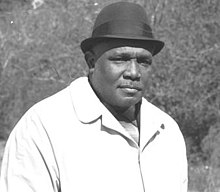Amzie Moore
| Amzie Moore | |
|---|---|

Amzie Moore photographed in 1963 by Harvey Richards.
|
|
| Born | September 23, 1911 |
| Died | February 1, 1982 (aged 70) |
Amzie Moore (September 23, 1911 – February 1, 1982) was an African-American civil rights leader, and entrepreneur in the Mississippi Delta.
Moore was born on the Wilkin plantation near the Grenada and Carroll County lines. Proud of his family roots, Moore liked to tell about his grandfather, a slave who lived to be 104: “He couldn't read or write, yet he accumulated more than a section of land and had [about] … twenty thousand dollars … saved when he died."
Left on his own at fourteen after his mother died in 1925, Moore completed high school but could not realize his dream of a college education. Through the rest of his life, however, he worked hard to educate himself.
Even before leaving Mississippi to fight in the war, Moore was involved in race relations, once organizing a successful rally of 10,000 blacks in his hometown. He served over three and a half years in the United States Army including time overseas before returning to his job at the U. S. Post Office where he had worked since 1935.
After the war, Moore opened a gas station, beauty shop, and grocery store on Highway 61 in Cleveland, Mississippi. His business also served as headquarters for the area’s civil rights efforts. At his gas station, which was one of the very few African-American owned ones, he refused to have separate white and black bathrooms.
Beginning in 1951, Moore, Aaron Henry and Medgar Evers worked with Dr. T.R.M. Howard, a self-made entrepreneur, fraternal organization leader, and surgeon, to build the Regional Council of Negro Leadership (RCNL). The RCNL sought to encourage entrepreneurship, self-help, and civil rights in the Delta. He participated in the RCNL's campaign to boycott gas stations that failed to provide restrooms for blacks. His gas station was one of the few that allowed blacks to use restrooms between Memphis and Vicksburg. During this period, Moore also belonged to the United Order of Friendship, a fraternal society headed by Howard to provide low-cost medical care to blacks.
...
Wikipedia
